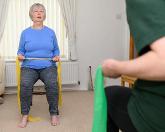see all jobs
BMI obesity measure for ethnic minorities should be lower, says NICE
UK medical advisory body NICE has suggested that local authorities should modify screening protocols for ethnic minorities, to act as an early warning sign against weight-related illnesses to which these groups are more susceptible.
In its latest set of local government public health briefings, NICE called for BMI thresholds to be lowered for people from black, Asian and other ethnic minority groups more prone to chronic conditions, such as heart disease and type 2 diabetes.
NICE highlights that these groups are up to six times more likely to be diagnosed with type 2 diabetes or stroke, plus 50 per cent more likely to die from cardiovascular disease, than those in the wider population.
For ethnic minority groups, NICE argues that the obese category - which indicates the greatest risk of weight related ill-health - should be a BMI score of 27.5 or more, rather than the current 30-plus.
The body believes the adjustment would allow for quicker intervention by medical professionals, lessening the likelihood of diseases progressing, while also providing economic benefits.
"As well as improving the health and wellbeing of individuals, taking effective action now also reduces future demand on health and social care services by enabling people to remain as independent as possible," says Professor Mike Kelly, Director of the Centre for Public Health at NICE.
David Stalker, CEO at ukactive, describes the recommendation as “essential” and likens it to his organisation’s Let’s Get Moving scheme – a physical activity intervention which places exercise professionals in GP surgeries, backed by funding from Sport England.
"We utilise a lower BMI threshold in screening our patients to ensure that some of the most important at risk people do not miss out on accessing the service," he says.
“It explores the barriers that patients may have to getting active and supports them to make a personalised action plan.”
First devised by Adolphe Quetelet more than 150-years ago, BMI is calculated by taking your weight (in kilograms) and dividing it by your height squared (in metres).
The system has attracted criticism in recent years for its failure to distinguish between fat and muscle, meaning that a person’s actual health state can be misrepresented.
In addition, there is also uncertainty over the impact that certain regimens can have on ethnic minorities due to a lack of evidence. In its recently published new guidelines for maintaining a healthy heart, the American Heart Association noted that more research was needed to fully understand the impact of preventative measures on ethnic minorities.
- News by sector (all)
- All news
- Fitness
- Personal trainer
- Sport
- Spa
- Swimming
- Hospitality
- Entertainment & Gaming
- Commercial Leisure
- Property
- Architecture
- Design
- Tourism
- Travel
- Attractions
- Theme & Water Parks
- Arts & Culture
- Heritage & Museums
- Parks & Countryside
- Sales & Marketing
- Public Sector
- Training
- People
- Executive
- Apprenticeships
- Suppliers





























